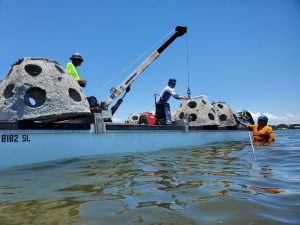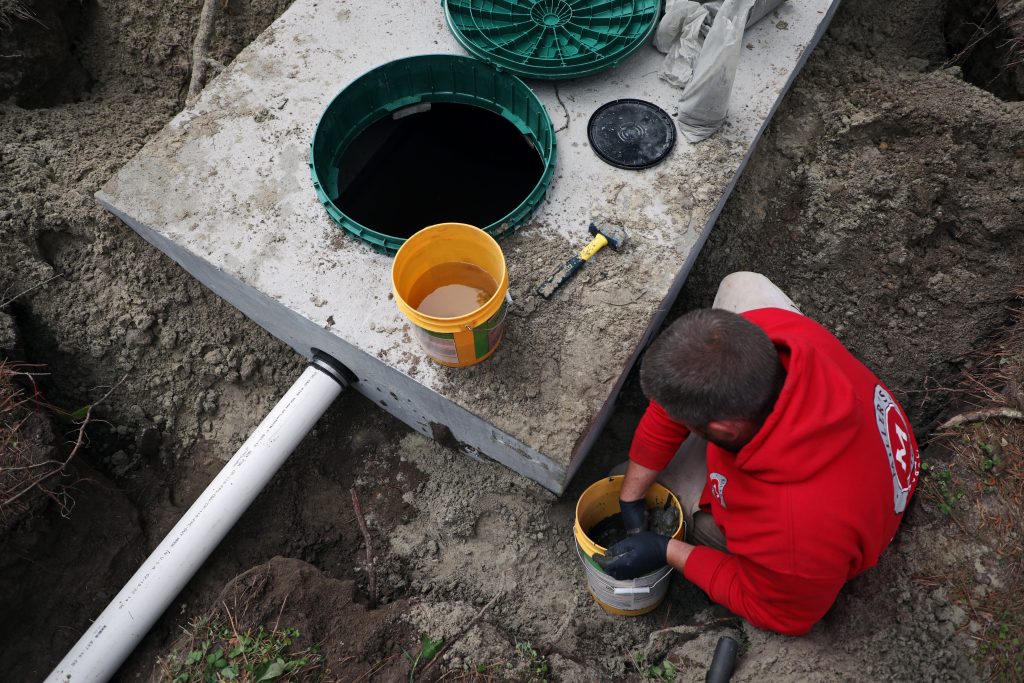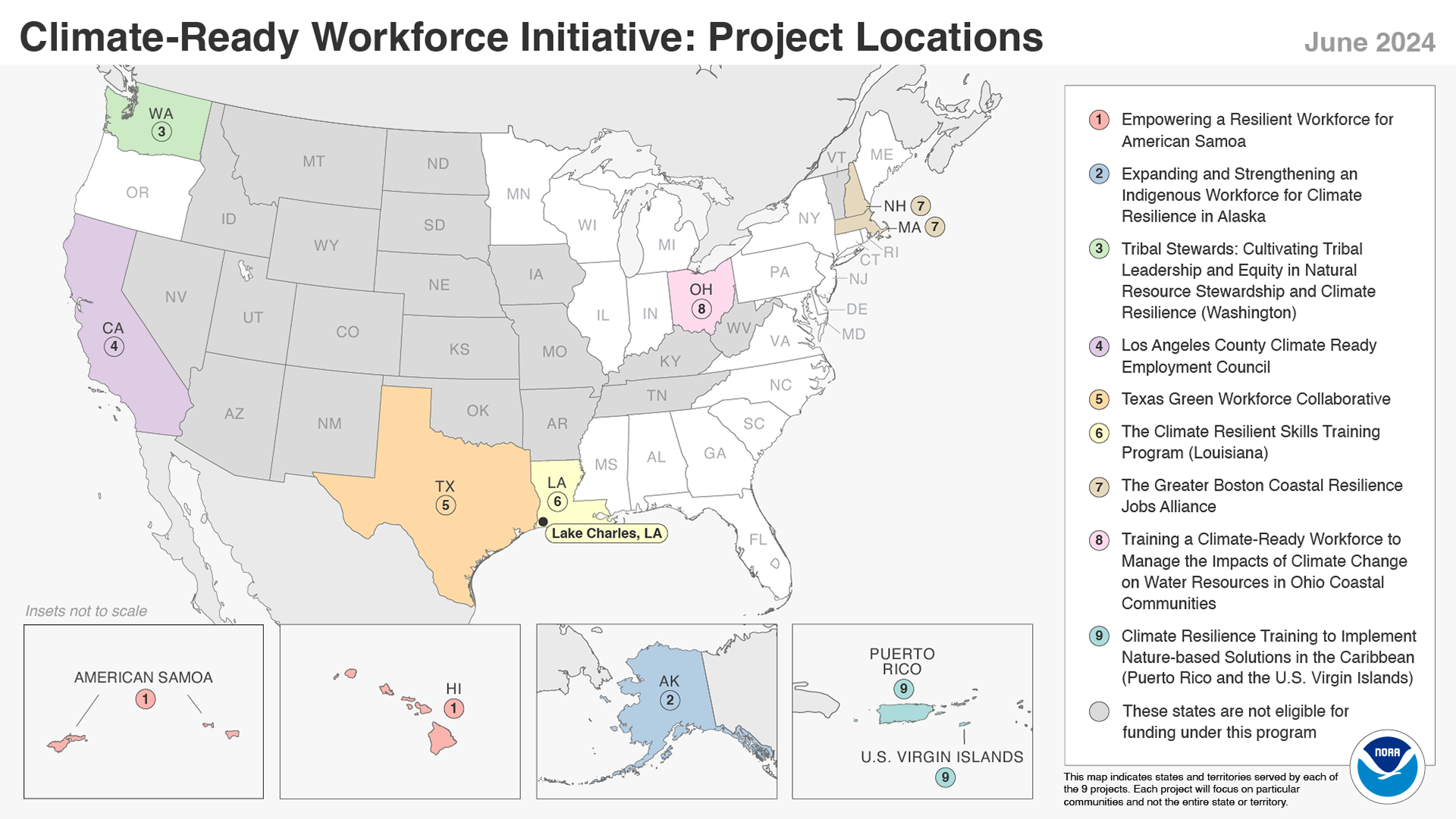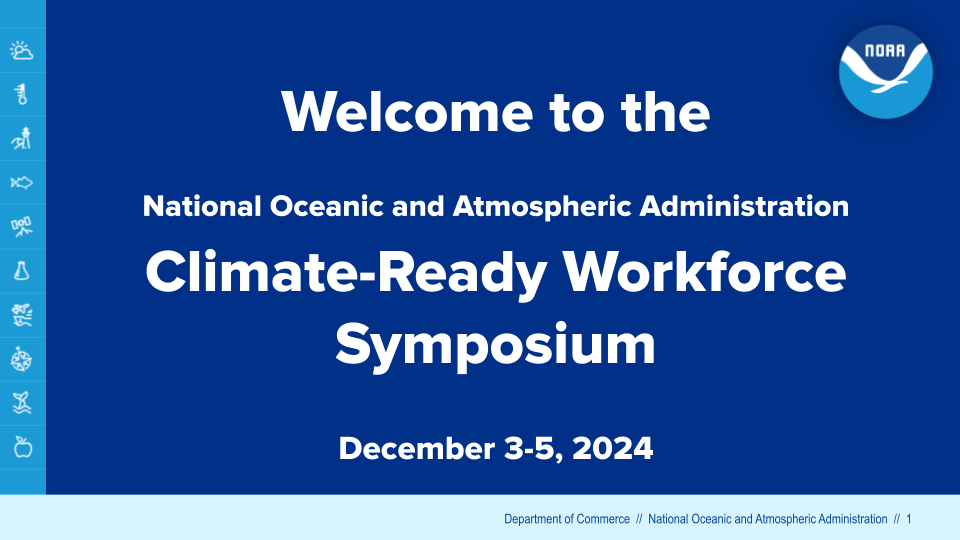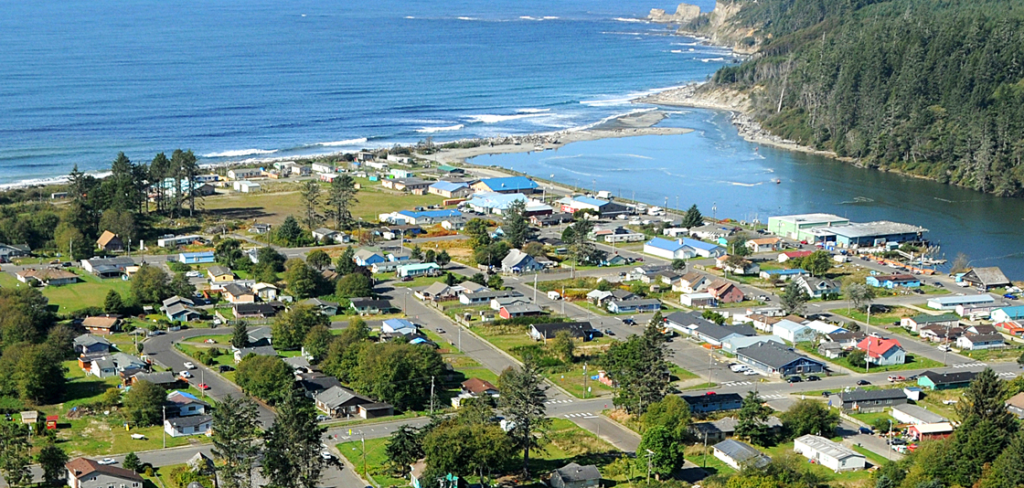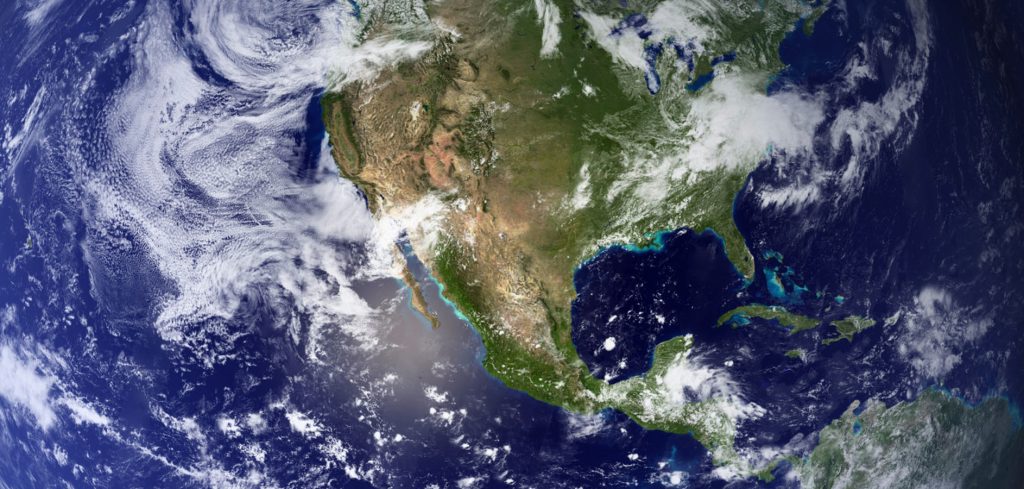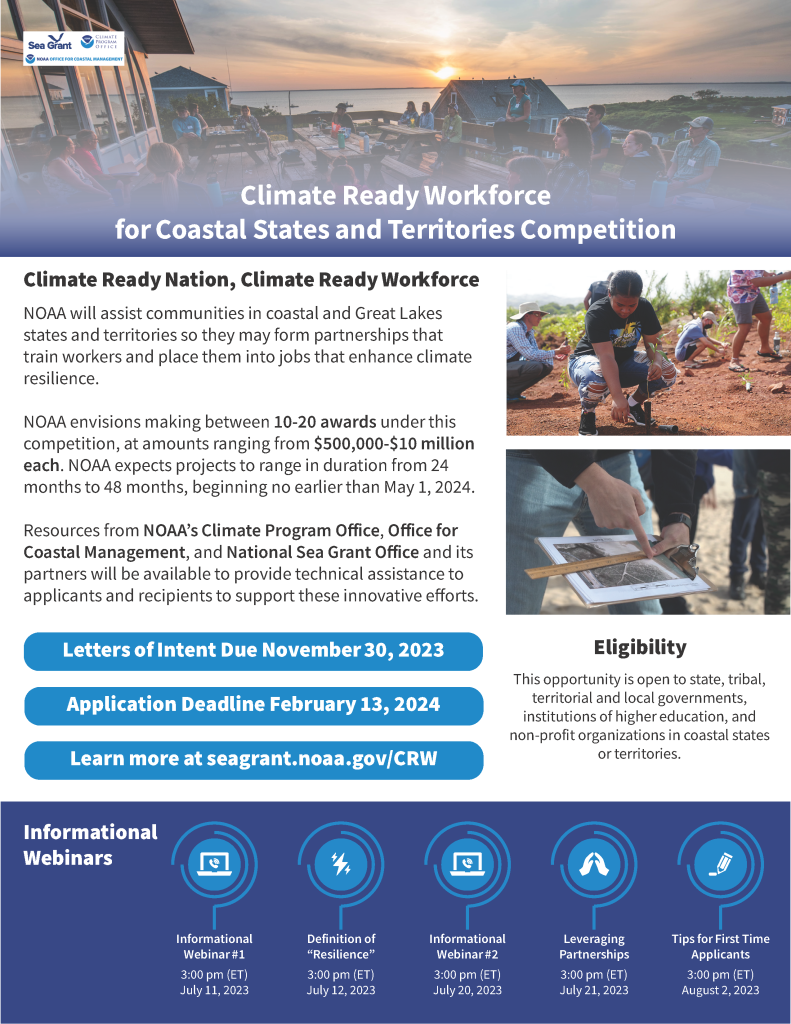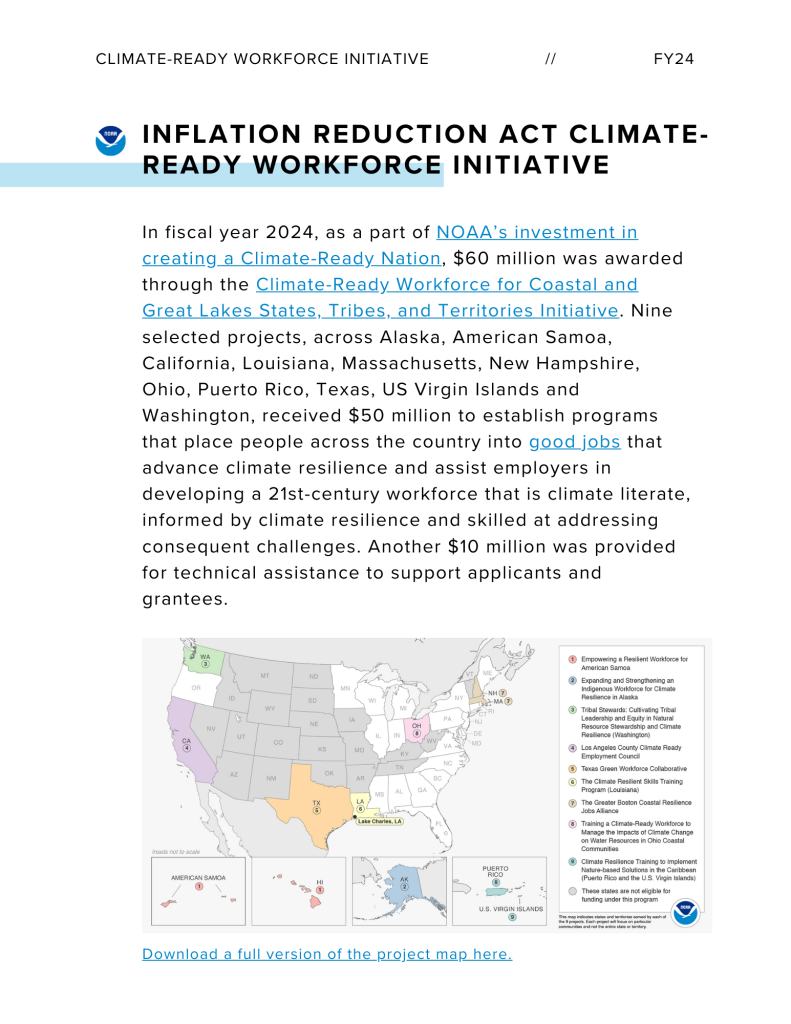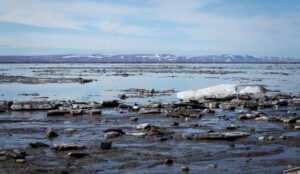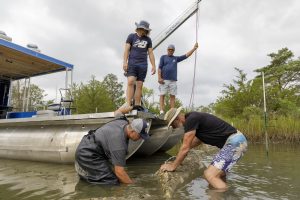NOAA’s Climate-Ready Workforce for Coastal and Great Lakes States, Tribes and Territories Initiative
Climate-Ready Workforce, Climate-Ready Nation
NOAA’s National Sea Grant College Program and Climate Program Office, with support from NOAA’s Office for Coastal Management, are establishing programs that place people across the country into good jobs that advance climate resilience and assist employers in developing a 21st-century workforce that is climate-literate, informed by climate resilience and skilled at addressing consequent challenges.
Funded by the Inflation Reduction Act, NOAA’s Climate-Ready Workforce initiative invests $50 million in nationwide projects that train and place workers in existing and emerging good jobs that enhance climate resilience. As part of the Justice40 Initiative, the Climate-Ready Workforce emphasizes supporting communities on the frontlines of the climate crisis—those that face disproportionate climate risks and inequities due to systemic and historical socioeconomic disparities and injustices.
What are Good Jobs Principles?
The Departments of Commerce and Labor have partnered to identify what comprises a good job. These eight principles create a framework for workers, businesses, labor unions, advocates, researchers, state and local governments, and federal agencies for a shared vision of job quality:
- Recruitment and Hiring
- Benefits
- DEIA
- Empowerment & Representation
- Job Security & Working Conditions
- Organizational Culture
- Pay
- Skills & Career Advancement
What kinds of jobs enhance climate resilience?
Jobs that perform one or more of the following climate-informed skills are considered to enhance climate resilience:
- Apply equity-centered climate resilience principles
- Reduce exposure, vulnerability, and risk to climate-related impacts
- Design, build, operate, maintain, and/or improve the infrastructure and systems (including nature-based systems) needed to reduce climate-related vulnerability and/or risk to people, assets, services, resources, ecosystems, or other attributes valued by individuals, businesses, communities, and/or governments
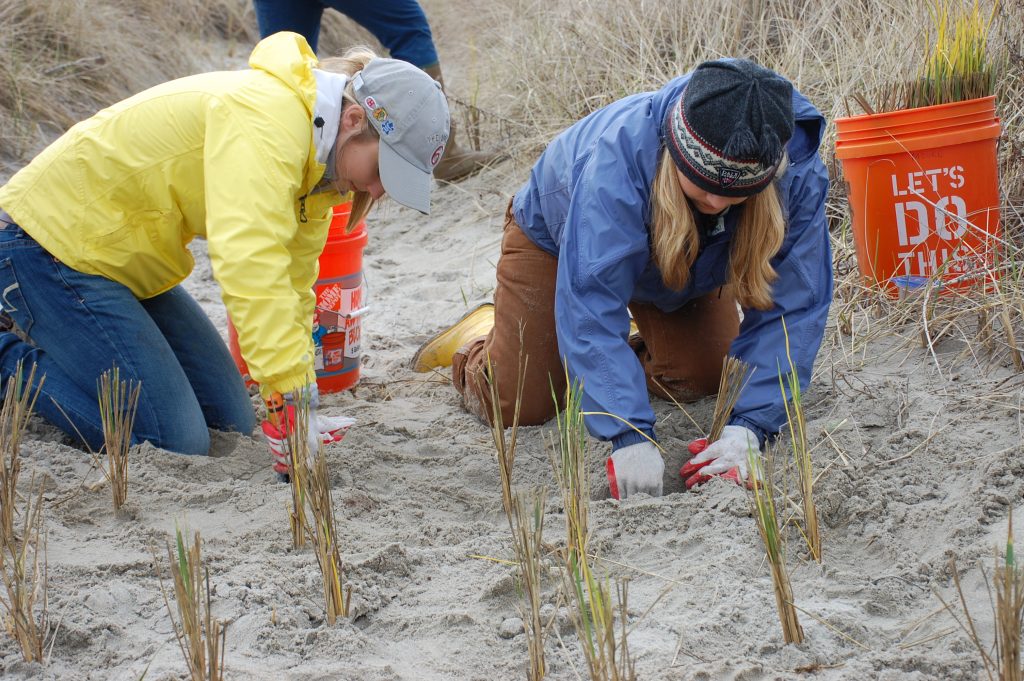

Selected Projects
Nine projects, from nine of the ten regions in the Fifth National Climate Assessment, were selected for funding. Common themes amongst selected projects include clean energy, nature-based solutions, green infrastructure, water management, and diverse recruitment. Learn more about these projects below.
The Greater Boston Coastal Resilience Jobs Alliance
Economic Development & Industrial Corporation of Boston: $9,799,687
This program in Massachusetts and New Hampshire will address the need for a skilled climate resilience workforce to implement Boston’s Climate Ready Boston Coastal Climate Resilience Plan and Massachusetts’ ResilientMass Plan. Participants will gain skills in areas ranging from nature-based solutions to emergency preparedness and response.
The Climate Resilient Skills Training Program
Flood Mitigation Industry Association: $6,926,245
The Flood Mitigation Industry Association along with strategic partners and climate resilience subject matter experts will develop the Climate Resilient Skills Training Program to provide coastal community, climate-resilient skilled workers in hard-hit Louisiana. The curriculum will be informed by climate science, real-time metrics and specialized flood mitigation and resilience industry knowledge. The program will recruit from local communities that are underserved and train and place workers with newly acquired skills including dry floodproofing, structural elevation, and application of nature-based solutions, in competitively paying green-collar trades jobs.
Empowering a resilient workforce for American Samoa
Hawaiʻi Sea Grant & American Samoa Community College: $1,748,942
This program will address the diverse and urgent climate crisis impacts in American Samoa and empower climate-ready communities. It will provide foundational training and strengthen the territory’s critical infrastructure through a partnership with American Samoa Power Authority, the territory’s only utility company.
Training a climate-ready workforce to manage the impacts of climate change on water resources in Ohio coastal communities
The Ohio State University: $4,852,566
The Ohio State University, in partnership with a community coalition, local utility services, community and HBCU colleges, and consulting employers, will train climate-ready workers — including technicians, scientists and engineers — to fulfill the specialized workforce needs of the water industry in the Great Lakes. Through a knowledge and skills-building framework in water quality monitoring and modeling, geographic information systems, stormwater infrastructure, and environmental policy and management, participants will form a diverse, digitally fluent workforce at various career levels and with the expertise to provide their communities with climate-resilient solutions for water system services in the coast of Lake Erie.
Tribal Stewards: Cultivating Tribal leadership & equity in natural resource co-stewardship & climate resilience
Washington State Board for Community and Technical Colleges: $9,257,231
This partnership between community colleges and Tribal nations aims to cultivate a new generation of Tribal leaders and co-stewards adept in integrative natural resources management and climate resilience. Through holistic support and redesigned educational pathways, the Tribal Stewards initiative will train both Tribal and non-Tribal graduates to contribute to co-stewardship, collaboration, and climate resilience efforts that serve Tribal communities. This critical partnership embodies a commitment to equity, Tribal sovereignty, and cultivating a diverse workforce equipped to tackle the complex challenges of the climate change era.
Los Angeles County Climate Ready Employment Council
Long Beach Community College District: $9,500,000
The Los Angeles County Climate Ready Employment Council will convene interested parties that play key roles in improving the county’s climate resiliency workforce, provide expertise that informs regional workforce needs assessment, develop training and job placement in climate resilience occupations in the solar and water management industries and more. Overall, this program will help meet the needs of employers, address climate resiliency in Los Angeles County, and connect underserved and under-resourced workers with jobs that align with the good jobs.
Expanding and strengthening an Indigenous workforce for climate resilience in Alaska
Tribal Government of St. Paul Island: $2,306,004
This project aims to address the demand for climate-resilient monitoring programs and local workforce development in Alaska by leveraging existing capacity within the Tribal Government of St. Paul Island’s Indigenous Sentinels Network, the Bering Sea Research Center and a partnership with Iḷisaġvik College. This collaborative effort will engage a diverse network of climate service practitioners, including Indigenous community leaders, state agencies, academic institutions and nonprofits, to support climate resilience workforce development that centers Indigenous knowledge in climate research in the development of Indigenous-led environmental monitoring programs.
Climate resilience training to implement nature-based solutions in the Caribbean
Protectores de Cuencas Inc.: $3,462,766
This program will develop new training curricula and identify existing training programs to address skills identified as those most needed to improve climate resilience in coastal Puerto Rico and the U.S. Virgin Islands. These trainings will build the capacity of these communities to prepare for climate change impacts and increase coastal resilience.
Texas Green Workforce Collaborative
EarthShare Texas: $2,146,559
The Texas Green Workforce Collaborative will create a sustainable, high-impact model for inclusive recruitment, skill-building, job training and certification, mentorship and community engagement among partners that will empower Texans from low-income and marginalized communities to pursue in-demand, living-wage green careers in various fields, including conservation, renewable energy and resilience, urban agriculture, green infrastructure, water management and more.
Climate-Ready Workforce Symposium
The first annual Climate-Ready Workforce Symposium brought together nine awardee teams from the National Climate Assessment ten regions to share project updates and discuss workforce development that will advance climate resilience nationwide. These projects were selected for funding through the 2023 Inflation Reduction Act Climate-Ready Workforce for Coastal States, Tribes & Territories Competition.
This virtual symposium took place on December 3rd, 4th and 5th. Watch the videos from previous meetings below to learn more about building a climate-ready workforce.
Climate-Ready Workforce Symposium 2024
Resources & Additional Information
Technical Assistance
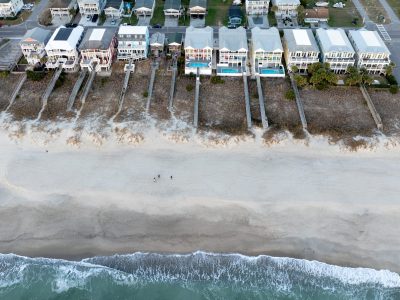

U.S. Climate Resilience Toolkit
The Climate Resilience Toolkit aims to help climate champions and their communities protect the things they care about from climate-related hazards. The Toolkit can guide you through the development of an equitable climate resilience plan.
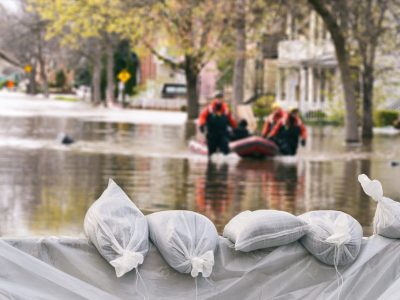

Federal Adaptation & Resilience Program Inventory
The USGCRP Federal Adaptation and Resilience Group has compiled an inventory of active federal programs that offer technical assistance for resilience and adaptation initiatives.


EPA Technical Assistance
The EPA can provide direct technical support or facilitate technical assistance for partners and offer a new technical assistance matchmaker factsheet.
Inflation Reduction Act Programs at NOAA
The Inflation Reduction Act (IRA) is a historic, federal government-wide investment that furthers NOAA’s efforts to build a Climate-Ready Nation. It provides $3.3 billion for NOAA to build on its commitment to help Americans – including tribes and vulnerable populations – prepare, adapt, and build resilience to weather and climate events.
This funding is organized into two main initiatives: Climate-Ready Coasts and Communities & Climate Data and Services.
Related Workforce Development Opportunities
More information coming soon.
Climate-Ready Workforce Stories & News
